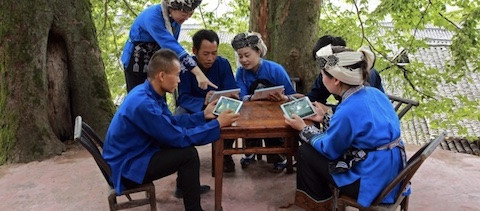
GCED Basic Search Form
Quick Search
أنت هنا
الأخبار

The “One College Student Per Village” programme at the Open University of China (OUC) is one of the laureates of the 2020 UNESCO King Hamad Bin Isa Al-Khalifa Prize for the Use of ICT in Education. The innovative programme provides an example of how Artificial Intelligence (AI) and associated technologies can create quality education opportunities for learners from remote areas and improve social and economic development in rural communities.
The programme was established in 2004 with the support of the Chinese Ministry of Education in response to the shortage of higher education resources and slow economic development in China’s rural and remote areas. Since then, it has not only improved local educational infrastructure and put in place distance learning programmes, but also integrated AI and Virtual Reality (VR) techniques, which significantly enhanced learners’ experiences and engagement.
Mobile learning and smart classrooms
In its efforts to provide quality learning experiences, the OUC set up over 500 cloud-based classrooms and smart classrooms in poorer areas in 31 provinces, municipalities and autonomous regions.
Online and offline learning environments have been created for local learners and the content adapted to their needs. “As local residents are mainly engaged in agriculture, forestry, animal husbandry and fishery, the University developed learning resources, which can be easily accessed via mobile applications from anywhere, including while working in the field or on the farm,” says Hou Songyan, associate researcher at the OUC.
Huang Haiyang, a student from Tiandong County in the Guangxi Autonomous Region, shared his experience of how the tools are making a difference in his work. “Since I can look through the information and related knowledge from my smartphone, it makes it easier for me to know how to control insects before they do harm on my fruit trees,” he says. “And when I get confused with how to use the pesticide, I can go to the smart classrooms to ask for help from my online tutor.”
Since the beginning of the COVID-19 pandemic, these classrooms have conducted over 2,000 live teaching sessions for more than 270,000 participants. 300 additional online courses and 100,000 “mini-lectures” were also opened to the general public. The series of lectures have generated nearly 100,000 views to date.
Using AI to create adaptive learning environments
The Smart Learning Platform enables teachers to create customized learning plans for students based on the profile of each learner and analyze their progress using big data.
Using AI, the platform guides students along different learning paths. It can distinguish learners’ intentions using voice and semantic analysis and can text learners and give feedback to their questions to help with their study.
It also lightens the workload of teachers by completing more routine tasks. Automatic assessments and automated essay scoring (AES) give students instant feedback and provide them with relevant learning resources. “This saves me a lot of time so that I can spend more time on preparing and reflecting the lectures and conducting academic research, etc.,” says Li Ganged, a teacher at the OUC. “Automated essay scoring is efficient in that I don’t have to mark these assignments myself but I can get a clear picture of where learners need help.”
In addition, Virtual Reality (VR) is being integrated into the programmes. Not only does it enable to illustrate and visualize abstract course content, but it also increases learners’ engagement and motivation. “In the Forestry programme, the VR can supply vivid virtual experiment just like in the real world on how to prune fruit trees,” says Hou Songyan. “The VR experience makes learning easier and more fun.”
Bridging the gap between rural and urban areas
To date, 29 programmes have been implemented using AI, covering over 1,500 OUC study centers nationwide. A total of 825,827 learners have been enrolled, 529,321 of whom have graduated. For Hou Songyan, the impact of students who graduated from the OUC on the local economy of rural and remote areas is already visible. “More contributions are made to the local economic and social development by those who have graduated from the programmes and been using their knowledge and skills in the local rural poverty alleviation and rural revitalization effort.”
Moving forward, the OUC will expand its potential target audience beyond the disadvantaged groups in rural and remote areas to include all members of society in the rural revitalization strategy. At the same time, the university plans to offer a wider range of programmes, degrees and diplomas, including short-term vocational training, and use AI techniques for knowledge mapping, automatic content generation, and smart answering chatbot technology to ensure round-the-clock online learner support.
“We do believe that AI will become an integral part of the future of education,”, says Hou Songyan. “It is a great honor for the Open University of China to receive this Prize. With this encouragement, the Open University of China will pay more attention to the use of digital technologies, especially cutting-edge technologies like big data, cloud computing, blockchain, AI, 5G, etc., in our future educational delivery, continue providing quality education programmes to people in remote and rural areas, and strive for the UN 2030 Agenda for Sustainable Development.”
URL:
